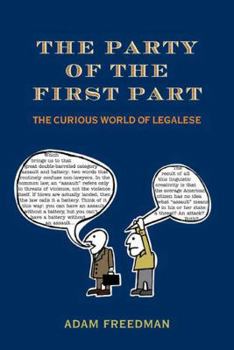The Party of the First Part: The Curious World of Legalese
Select Format
Select Condition 
Book Overview
A "lighthearted but lucid explanation of legalese" that offers something for language lovers and legal eagles alike (William Safire, "The New York Times Magazine")For better or for worse, the... This description may be from another edition of this product.
Format:Hardcover
Language:English
ISBN:0805082239
ISBN13:9780805082234
Release Date:September 2007
Publisher:Henry Holt & Company
Length:242 Pages
Weight:0.85 lbs.
Dimensions:0.8" x 5.9" x 8.5"
Customer Reviews
5 ratings
especially good for paralegal students
Published by Thriftbooks.com User , 14 years ago
I found this book quite by accident, but it has surely eased some of the fierce confusion I was experiencing with the legal documents I am becoming familiar with in my course of studies to become a paralegal. All of my classes are taught by lawyers, and so not only did this book provide a refreshing review of all that I've learned over the past three years, it made me have the big belly laughs at the same time. I cannot recommend this book highly enough. I have bought three copies of this book - one to lend out, and two for my professors.
See you in court
Published by Thriftbooks.com User , 14 years ago
A slim volume, packed with interest. The chapter on Wills, Wives and Wrecks is worth the price of admission. Are you sure that your will can pass the Fertile Octogenarian Rule? Adam Freedman has assembled a menagerie of legal expressions, many dating back to Norman French, with very specific meanings forged in thousands of judge's decisions. It's tempting to scorn legalese as a way for lawyers to obscure what they're up to, but the truth is that careful use of legal terms is a vital part of our justice system. This book is well indexed if you just need to consult it in a pinch, but it's so entertaining that you'll want to read every word. The Party of the First Part: The Curious World of Legalese
In a perfect world this book would be required reading
Published by Thriftbooks.com User , 15 years ago
"The Party of the First Part" is an erudite, hilarious tour through 21st Century American legalese. Alan Freedman leads us through the ankle-grabbing underbrush of redundancy, dead phrases, faux Latin, and mindless obfuscation into which every reader - and writer - of legal documents eventually must stagger. Freedman is a sure-footed guide who knows the territory. Time and again, he yanks up a hoary word or phrase and shows us its tangled roots. Sometimes we find, clutching a root with a deathgrip, an advocate of the so-called "Precision School" of legal drafting. These lawyers and profs fear that awful chaos would result if lawyers quit using ancient Anglo/French/Latin phrases, in favor of words used by 21st Century Americans in everyday life. Chaos? Well gosh, people might have to *sue* if they can't agree what a word or phrase written in 21st Century English means. Uh-huh, thinks I: as if they aren't already suing by the thousands over the meaning of Roman-numeraled legal documents bristling with boilerplate clunkers such as "witnesseth," "hereinabove," "aforementioned," "covenant and agree," and "hereunto." This book should be required reading for every law student, law professor, judge and lawyer in the United States. It encourages those among us who want to write clearly when drafting legal documents. I hope it will at least give pause for thought to our colleagues who never met a hundred-word clause in the passive voice, that they didn't like.
Libel or Slander ?
Published by Thriftbooks.com User , 16 years ago
Poking more than a bit of fun at the "worrying gap" - the distance between the language of the public and that of the legal profession, 'Legal Lingo' columnist Adam Freedman takes a humorous swing at the "Precision School", which holds that the complexity of legal language flows from the need of lawyers to be super precise. A position that challenges the "Plain English" camp, which advocates that ordinary citizens ought to be able to understand the laws they live under and the contracts they sign. Demonstrating a wit and humor that may be lost on some legal scholars, Freedman traces the origin for the distinction between "libel" and "slander" while providing an ample supply of one-liners for use during your next meeting with legal counsel. If that is not enough, you may be interested in knowing that the Texas Cattlemen's suit of Oprah Winfrey was done under a "Food Disparagement Law" - statutes meant to protect agricultural products; veggies are a group with especially tender feelings, you know. His discussion of "boilerplate" language notwithstanding, I found the book to be riveting reading. From now on, I will "know all men by these presents," boilerplate is contractual and may require one to accept that there is a 'Sanity Clause'. Dennis DeWilde, author of "The Performance Connection"
Hilarious and Eye-Opening
Published by Thriftbooks.com User , 16 years ago
A book about legalese? I was skeptical, but this book grabbed me from the start. As a lawyer and an English major, I've always wanted to know where legal language took a wrong turn. As Freedman explains, legalese got to where it is today by taking lots and lots of wrong turns. Like the legal tendency toward redundancy: "will and testament" "fit and proper" "breaking and entering." These phrases developed after the Norman Conquest when lawyers and clients switched back and forth between Anglo-Saxon and French (in each case, one word is Anglo-Saxon and the other is French). Not only is the book informative, but it's also laugh-out-loud funny, especially when Freedman describes the bizarre resistance of lawyers to using "plain English" in place of their cherished legalese.




